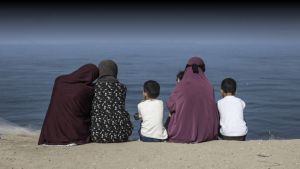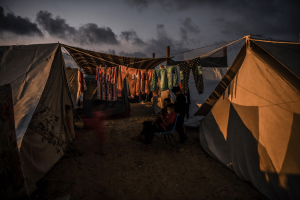Gaza Forward (Hamas at the Table)

If Auschwitz archives document the tragedy of human history in the twentieth century, then what is documented on the Gaza Strip on television screens in 2023 is the collapse of humanity in the twenty-first century.
Making comparisons is a learning approach; after all, historical narration relies on the accounts of historians. Yet when it comes to lessons learned, this article is inspired by path dependency theory, which strives to learn from the past in order to prevent the repetition of past mistakes in terms of atrocities against civilians. Thus, it asserts that the commitment “Never Again,” stressed and reiterated regarding the lessons learned from the Holocaust and aiming to end human sufferings rather than allow massacres and genocide, must apply to all of humanity, regardless of religion or ethnicity. It must protect all human beings, Gazans included.
Moreover, we must remember that the United States was not able to defeat the Taliban in Afghanistan or ISIS in Iraq even though it waged an insane war and spent countless millions of dollars on weapons and military equipment. Ultimately, however, the United States resorted to negotiations to reach a ceasefire and elections to prepare for the “Day After.” While the war, waged under the pretext of serving to eliminate terror and bring democracy, caused many tens of thousands of souls to perish and brought mass destruction, it did not bring about democracy.

Photo courtesy of Euractiv
To reach the 1988 Good Friday Agreement in Northern Ireland, the United States and Great Britain had to include Sinn Fein and the Irish Republican Army because the Irish public agreed to a deal only once the party’s military wing was included at the negotiating table. The parties realized that ideologies cannot be killed with bullets. Thoughts cross geographical borders and span across time, and as long as oppression exists under occupation, the oppressed will struggle to gain independence, freedom, dignity, and liberation. This realization is common sense.
After three months of continuous bombing, the shelling of residential towers, health and medical facilities, schools, and places of worship, and indiscriminate operations that have targeted civilians, journalists, and activists, Israel has not been able to defeat Hamas. Not because its military might is insufficient. Israel has one of the most sophisticated armies in the world, aided by strategic, financial, and weaponry support from superpowers. It is simply because Israel’s goal is not SMART. As John Whitmore explained, the science of strategic planning requires SMART goal setting.*1 Israel’s military goals, however, are neither specific nor measurable, attainable, or realistic, and they lack a time frame. As Israel aims for destruction, its goals are quantitative rather than qualitative. Under the watchful eyes of world military experts hoping to learn about new tools, Israel’s military leadership is relying on AI-generated tools that allow it to determine targets more rapidly, on a much wider scale, and “in a much wider theatre of operations.” In particular, Israel employs an AI platform called Habsora (lit. “the Gospel”), which has significantly accelerated “a lethal production line of targets that officials have compared to a ‘factory.’”*2
The shock doctrine could indeed explain the insanity behind Israel targeting everything in Gaza. However, with the toll of registered deaths rising to over 26,000 civilians, almost half of whom are children, while thousands remain under the rubble,*3 it is time to apply wisdom as a new paradigm. Hamas cannot be eliminated. This aim cannot be perceived as a goal; it is simply the pretext for the revenge that Israel is exacting. Wisdom means that Hamas must be included at the negotiation table. Whether we like it or not, history has proven that more inclusive peace processes produce more peaceful and sustainable agreements. The representatives of the international community who still advocate for the two-state solution must not ignore that fact. While Netanyahu is rejecting all peaceful solutions, he is, in fact, insulting the United States and like-minded countries that still call for this solution. Wisdom gained from the Northern Ireland case study shows that in order to reach a sustainable peace between the two peoples, Hamas is an indispensable actor. Only a comprehensive framework that includes all parties, with no exception, can be a hope for future peace deals.

Photo courtesy of Daily Sabah
The rhetoric of “After Hamas” is, in fact, another Machiavellian tactic for Netanyahu, who procrastinates and buys time for more annexation, more forced evictions, more settlements, more terror, more killings, and more detentions. Aided by biased Western media, Netanyahu has managed to paint the Palestinian right of self-defense (Article 51 of the United Nations Charter)*4 and right of resistance as terror. While Israel withdrew from Gaza and redeployed 9,000 Israeli settlers, the Strip remained under the total control of the Israeli occupation authorities. The goal behind the disengagement from Gaza was not to grant Gaza freedom. As articulated by Ariel Sharon’s top aide Dov Weisglass, the disengagement was actually meant to ensure that “there will not be a political process with the Palestinians.”*5 Today, Israel is using Hamas as a fig leaf for its annexation efforts, and the rockets of the resistance are labeled terror. The Israeli withdrawal from Gaza was done unilaterally, without coordination with the PLO or the PA, and it led to the institutional and political split and division that has been in existence for almost two decades. Gaza has faced five major military raids and incursions since 2007. Hamas relies on rocket fire as a negotiating tactic to pressure Israel to ease access of goods and people and loosen the blockade. On the other hand, Israel employs military might to deter Hamas. These tactics of Hamas and Israel enabled short-term victories for both at the expense of a long-term resolution. Uncontested, Palestine lives under a prolonged Israeli military occupation that must end.*6
This is not a war against Hamas. This is a war against the Palestinian right to self-determination, a series of war crimes in violation of Article 49 of the Fourth Geneva Convention. With more than 1.9 million civilians displaced in Gaza, Israel engages in forced displacement that amounts to a war crime. An attempt to bring about a second Nakba in 2023. Parties to the conventions are obliged under Article 146 to search for criminals and bring them to court.
Israeli settler violence (unchecked, even under the watchful protection of Israeli soldiers) and military invasions into the West Bank have led to more than 320 Palestinian deaths in the West Bank over the past three months. The number of Palestinian prisoners is mounting and has reached more than 8,000 civilians, 2,200 of whom are held in administrative detention (without a trial), which is not only a violation of international law but also proves that Israel is not targeting Hamas.
Israel was created 75 years ago on the land of Palestine when a settler-colonial project was kick-started and never put to a halt under the framework of an illegal military occupation. In Gaza, 2.3 million civilians have been suffering under a deadly blockade for 16 years, during which Israeli military forces waged four wars, and this is the fifth.*7
Diplomacy and multilateralism have failed humanity in Gaza. Numerous condemnations by international organizations have fallen on deaf ears and have not led to actual, concrete changes for Gaza due to the immense power of the well-organized and amply financed Israeli lobby. Gaza reconstruction plans that are guided by the rhetoric of development under occupation cannot be tolerated any longer. As millions of dollars are funding Israeli missiles, a Marshall Plan for Gaza is not sufficient; a political path must now come ahead of any economic one.
The Palestine cause has resurfaced on the global agenda post-October 7. The price is high, and reality is daunting, yet Palestine has not lost the current war on Gaza despite the huge loss of life. Yet the emerging political paradigm is essential. Many argue that this is not the time to talk about the Day After and that we must consider the options once the war stops.
With a heavy heart, I disagree. Palestine has not lost the war; far from it, in fact. Moreover, any discussion of the future with an “after Hamas” undertone is not only a waste of time but malicious. With these two premises in mind, it is essential that we discuss the Day After. Major events have already happened, myths and taboos have been shattered, world opinions have swayed to our advantage in a manner we never dreamt of, and a new reality is certainly unfolding. With all due respect, waiting to discuss the Day After until after the bombs stop dropping is like putting our heads into the sand. We must discuss a new political paradigm. The Day After includes the need to discuss the issue of rebuilding Gaza, home to 2.3 million people, and to find ways to reset and plan to build the Palestinian state in the making. Inspired by a strategic leadership and inclusive approach, it is time for PLO brainstorming with Hamas at the table. Polls that reveal the increasing popularity of Hamas do not necessarily indicate a favor of the movement’s ideology but rather reflect approval of its leading and expressing the Palestinian aspirations for freedom. There is a huge difference between the two, and only ballots shall determine what the people want.
The Qatari role, from Lebanon to Afghanistan to Venezuela to Palestine, reflects everyone’s confidence, including the United States and Israel, which enhances the influence of its increasing role as a mediator in the region. Doha has increased its impact through its influence on Islamic movements. As a result, Doha can now serve as a facilitator or mediator between foreign countries and Islamic organizations because many countries, even in the region, have no relationship with these organizations. Doha’s influence on the success of the peace talks between the United States and the Taliban gave Qatar more international attention, and this is what we see today in its dealings with the Hamas file, with full American and Western blessing.
While a Saudi mega deal might translate under the framework of Trump’s Deal of the Century, I am afraid that it will lower the bars under the pretext of ending the bloodshed and sufferings in Gaza but at the expense of Palestinian right to self-determination. Qatar is well placed to mediate a comprehensive, sustainable peace deal. Qatar continues its diplomatic efforts to renew the truce in Gaza and hopes to achieve a comprehensive and sustainable agreement that ends the war and leads to serious talks toward a political process, with talk now arising about a peaceful path. Doha can play the role of a mediator in peace talks in the Middle East and achieve what it achieved in Afghanistan in terms of a ceasefire. The eventual Israeli withdrawal from the Gaza Strip and all occupied territories will be in accordance with international legitimacy. I hope that mediation will arrange elections as it did in Venezuela and Lebanon.
To conclude, I will argue that to guarantee a strategic peace, Hamas is indispensable in any future political paradigm. Hamas adhering to the 1967 borders makes it not very different from Fatah. The 1967 borders mean that Gaza and the West Bank, like East Jerusalem, should be treated as one territorial unit, with one Palestine for all Palestinians.
*1 Performance Consultants, The Grow Model, no date.
*2 Harry Davies, Bethan McKernan, and Dan Sabbagh, “”The Gospel: How Israel Uses AI to Select Bombing Targets in Gaza,” The Guardian, December 1, 2023.
*3 X (formerly Twitter), Euro MED monitor.
*4 Charter of the United Nations, —Chapter VIIAction with Respect to Threats to the Peace, Breaches of the Peace, and Acts of Aggression, Article 51.
*5 The Question of Palestine, ”–“Israeli Dis-engagement Plan Letter from Palestine,” United Nations, October 8, 2004.
*6 Dalal Iriqat, “75 Years of Ongoing Nakba,” Palestine Israel Journal, PIJ, May 2023, with the theme “75 Years Palestine Nakba/Israel Statehood,” vol 28, No. 1 & 2, 2023, pp. 6–15.
*7 “’Timeline: Israels attacks on Gaza since 2005,” Al Jazeera, August 7, 2022.
Dalal Iriqat is an associate professor at the Arab American University – Palestine, AAUP. She has been a weekly columnist at Al-Quds newspaper since 2016 and was identified as a Young Global Leader at the World Economic Forum YGL 2021. She is the founding president of Business and Professional Women BPW Palestine 2022.
Briefly, Turbo Computers & Software Co. Ltd. ̶ publisher of This Week in Palestine ̶ started in September 1985 as a software house. In 1986 we developed a full-fledged multi-lingual word processor/typesetter around the (then) new laser printers. We were not satisfied with what was available on the market as far as word processors, so we simply built one of our own. It took us almost a whole year to produce a decent word processor for which we also built a set of fonts in Arabic; dot by dot. The package was a brilliant and an affordable solution for those who needed to typeset text in Arabic. Printers were particularly pleased with the product after realizing that they could use it to typeset books. Seeing its business potential, we started to use TurboSet, as we called the product, ourselves and began to offer layout services, which in turn introduced us to the design world.
In the early 1990s we shifted almost totally to being a design firm. Our technical background, coupled with being blessed with talented designers, prompted us to cater to the higher end of the market with designs and creativity that conform to international standards. For over than two decades now, we’ve been commonly known as Turbo Design.
In December 1998, Turbo Design put out the first issue of an English-language magazine called This Week in Palestine (TWiP). Twenty-two years later, the magazine is considered to be a major Palestinian success story and, unfortunately, remains the only English-language magazine of its kind in Palestine. TWiP essentially promotes and documents Palestine. In 2006, TWiP became a high-end brand under which annual agendas, calendars, and posters are marketed.
